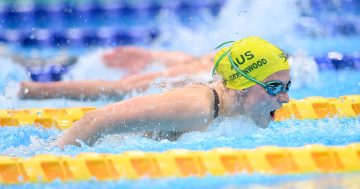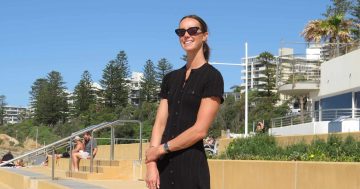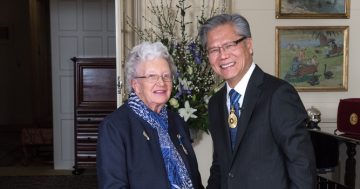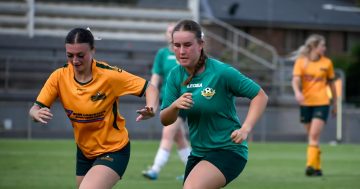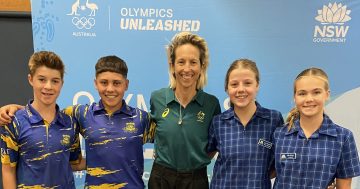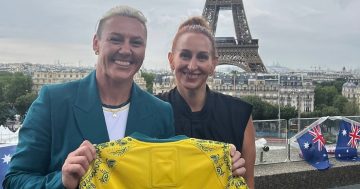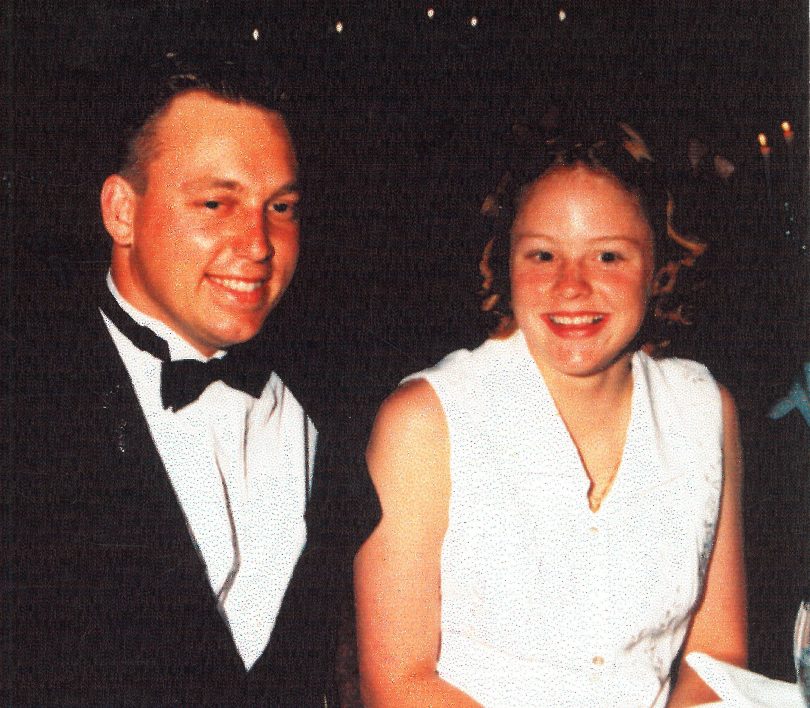
Siobhan and Glen Fowler at the 1997 Australian Paralympian Committee’s Paralympian of the Year Awards in 1997 where Siobhan won the Developing Paralympian of the Year award. Photo: Supplied.
Standing atop the podium at the Sydney Paralympics for the sixth time in the space of a week, 17-year-old Canberra student Siobhan Paton was beaming.
Surely this was the start of an incredible ride.
Siobhan was the queen of the Paralympic pool, winning a then-record six gold medals in events ranging from the 50 freestyle to the 200-metre individual medley, and breaking nine world records along the way.
She endeared herself to the Australian sporting public with her humble yet no-nonsense approach.
“It was just another swim meet. I was just better on the day” she said. To put it simply, she inspired the nation with her performances in and out of the water.
Siobhan was named the Australian Paralympian of the Year in 2000. She was honoured on a postage stamp and she was awarded an OAM.
They were heady days indeed. After the Sydney Paralympics, Siobhan was already starting to map out her post-2000 future. Included in the plans were the 2004, 2008 and 2012 Paralympics.
But the 2000 Paralympics would turn out to be her last.
Born with an intellectual disability from birth, Siobhan started swimming at eight years of age after discovering that swimming could strengthen her joints, which were weak because of a connective tissue disorder.
Her mother Judith was the unsung hero, driving Siobhan to training with the Telopea Club and supporting her swimming day after day, year after year.
After initially swimming in able-bodied events she started competing for the first time with athletes with a disability in 1997. A year later Siobhan won five gold medals at the World Championships in Christchurch.
Driven by a strong work ethic and incredible ability, under the guidance of well-regarded coaches, Peter Freney and Les Barclay, Siobhan was heading towards the Sydney Paralympics as the form swimmer in the S14 class.
Nobody, though, could have foreseen the impact she would have on the meet in 2000, winning six of Australia’s 63 gold medals. It was one of the best moments of her life.
As Siobhan explains: “I was very dedicated to my sport. In the water there was freedom. I was a fish. I loved swimming because I met some wonderful people throughout the world. And then it came to an end.”
The “end” refers to what was to unfold in the days and weeks following the closing ceremony. It would rock Siobhan and the entire Paralympic movement to its foundations.
In one of the most scandalous events in the history of sport, it was revealed that the Spanish basketball gold medal-winning team for athletes with an intellectual disability had only two players with an intellectual disability.
The team was stripped of the gold medal before the International Paralympic Committee announced those events involving athletes with an intellectual disability would be abandoned for the 2004 and 2008 Paralympics.
For Siobhan, it was a disaster.
In the wake of her superb performance in 2000, the news could not have been worse.
“I was devastated. We felt like we were being dropped like a hot potato.”
Without the purpose of training, competing and travelling the world, Siobhan spiralled into depression, before reaching a particularly low point in her life. At that time she ended up in hospital for six weeks.
She reached out to many for support without a great deal of success. Finally, she found help from the ACT Academy of Sport.
Despite struggling to fill the void created by the loss of the Paralympics, Siobhan won 14 gold medals at the International Sports Federation for People with an Intellectual Disability World Championships in 2004. In the same year, she won three gold at the Global Games before retiring from competition.
Her sister Sarah was also a competitive swimmer and she competed in the 800 freestyle at the 2004 Summer Olympics in Athens.
Now at 37 years of age and a full-time carer for her mother, Judith, Siobhan’s battle with depression continues: “There are good and bad days. I’m battling depression; I live with it.”
She is matter of fact when it comes to reflecting on her performance at the Sydney Paralympics; “I had my chance. I did extremely well,” she recalls.
“Everything happened quickly. Then it died quickly.”
There have been moments of joy, though. One significant moment was when Peter Freney’s granddaughter, Jacqui, who was born with cerebral palsy diplegia, won eight gold medals at the London Paralympics. She broke Siobhan’s record for the most gold won by an Australian athlete at a Paralympics.
Jacqui described Siobhan as her inspiration, and to a certain degree, it put things in context for Siobhan who similarly felt inspired by Jacqui’s performance.
For Siobhan, in the cloud of depression, it provided perspective on the positive influence her performance had on many.
Twenty years on, it still resonates.
Original Article published by Tim Gavel on The RiotACT.







